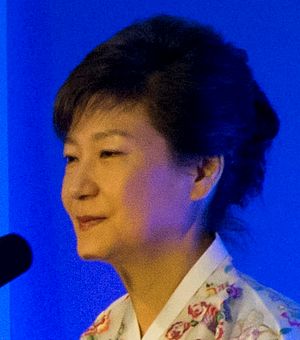Park Geun-Hye was sworn into power on February 25, 2013 as the 11th President of South Korea after defeating her opponent Moon Jae-In of the opposition Democratic United Party. In her inauguration speech, she promised to revive the economy and prioritize national security and social welfare. Also, she would move away from her predecessor’s hardline North Korea policies and instead make a concerted effort to deepen engagement with South Korea’s northern neighbor, offering a trust-building process. Yet, after nearly a year in office, those promises have been hard to keep and her presidency faces several challenges.
First, she has scaled back pensions plans that would increase support for the elderly, giving them a monthly allowance of 200,000 won ($186). Although it was one of her key campaign pledges, there were concerns that it would put heavy burdens on future generations. The revised plan that she has proposed instead offers means-tested payments for the elderly. Opposition parties have accused Park of breaking her promise to the South Korean people. South Korea is ranks worst among the 30 members of the Organization for Economic Cooperation and Development in terms of poverty rates among senior citizens.
Also, promises of half-price college tuition fees were pushed back to 2015 due to revenue shortfalls. South Korea has the third highest tuition among OECD countries. In South Korea, higher education is highly valued and the country is often praised for having a high university enrollment. Yet with steadily rising tuition fees and a rise in youth unemployment, the country’s youth feel that something’s got to give. Ms. Park’s welfare commitments are undermining her credibility, especially among the young and old voters who elected her last December. If this sounds familiar, it should. Lee-Myung Bak, who also promised education reform in 2007, went back on his campaign pledge to halve college fees.
If that wasn’t enough, the rail workers’ union went on a three-week strike this month to protest what they believe is the government’s move to push ahead with privatizing rail operations. The establishment of a new subsidiary for the state-run operator KORAIL is largely seen as a precursor to privatization, despite assurances by the government. The drawn out strike has halted and a parliamentary subcommittee will be established to address the issue of privatization. Largely as a result of the strikes, Park’s approval rating has dipped under 50 percent.
Her year in office has also been troubled by a standoff over allegations that the government meddled in last year’s elections. Both the National Intelligence Service and the military are believed to be involved in a smearing campaign that undermined Park’s opponents and helped her win last year’s elections. The Cyber Warfare unit is being probed for their possible involvement. Some have gone as far as to call for Ms. Park’s resignation. In various cities around the world, South Koreans have protested over these accusations of tampering by state agencies in the electoral process. Ms. Park has promised a transparent investigation.
She has also reneged on her pledge to reform big conglomerates and unfair business practices by limiting the power of owners. She is criticized for her efforts to ease business regulation from chaebol firms, which have been blamed for hurting fair competition in the market.
As we approach 2014, Park might have to make good on some of those campaign promises and deliver good leadership in order to win over her critics. However, dealing with gross income inequalities and an inability to employ the newly educated while simultaneously trying to tackle the potential instability in the North will be extremely difficult.
Park’s North Korea Policy
Although North Korea didn’t figure prominently in the election, dealing with North Korea will be one of Ms. Park’s foremost challenges. We have seen growing volatility and tensions in Northeast Asia. Park promised to engage and build trust with Pyongyang but that policy was put on hold after the North’s nuclear test in February.
As tensions mounted, the North cut off the communication hotlines with the South and closed off the Kaesong Industrial Zone, signaling a new low for the inter-Korea relationship. Pyongyang delivered frequent threats of war against the U.S. and South Korea. After several months, tensions again eased slightly, allowing for the zone to reopen after a 5-month closure. Hopes to reunite families divided by the Korean War were indefinitely postponed after the North accused Seoul of provoking them to make conciliatory gestures.
In light of the execution of Kim Jong-Un’s uncle, Jang Song-Thaek, Park’s policy of engagement becomes even harder. Given the instability in the North’s leadership, there are rising concerns in the South that Kim will launch another nuclear or missile test in early 2014 to divert attention from the execution. Park has called the situation “grave” and is making preparations for all possibilities.
Even though containment and military pressures have failed, expect policy continuations akin to that of her predecessor and less like that of former presidents Kim Dae-Jung and Roh Moo-Hyun in 2014. Given the North’s persistent recalcitrance, it looks as though Park might have to go back on another one of her campaign’s promises.

































